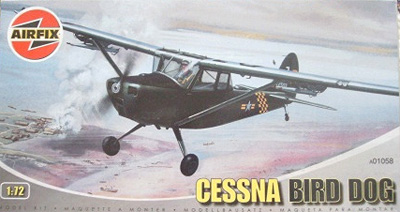|
| Formerly known as the Cessna L-19, the "Bird Dog" served with the USAF, Army and Marines during the Korean and Vietnam wars. More than 3,400 were built. |
|
| The concept of an airborne controller capable of directing both artillery and air support/strike aircraft over the battlefield came into widespread use during the Second World War. This evolved into the FAC (Forward Air Controller). |
|
| The FAC, often an experienced fighter pilot, was assigned to a specific geographical area so he was virtually on-the-spot at all times. The FAC would call in fighter-bombers and mark a target with either smoke canisters or white phosphorus rockets. After the attack, the FAC stayed on station to determine if the target had been destroyed. |
|
| Bird Dogs could carry mixed stores of smoke canisters and "Willie-Pete" white phosphorus marking rockets on their four underwing pylons. At night they carried a load of 2,000,000 candlepower flares to provide light for outposts under attack. |
|
| The original molds for this Airfix kit were created in 1973 so it's no surprise that it has raised panel detail, thick distorted transparencies and visible injection pin marks. Despite all this it's still not a bad kit, it's reasonably accurate and virtually the only option for an O-1 in 72nd scale. |
|
| I was pleased with the final results and recommend the kit to anyone who doesn't mind the extra challenge of creating their own clear parts. |
|
| Here's my O-1 on the workbench. Most of the cockpit details are scratch built. |
 |

Kit: Airfix #01058 |

Scale: 1/72 |
| Cost: I paid $4.99 (US) at M.A.L. Hobby Shop in Irving, Texas. A bargain. |
Decals Used: Stock.
Optional markings were provided for 23rd Tactical Group, Bien Hoa, Vietnam. |
| After Market Parts: None used. |
Review: Kit is molded in light gray "Airfix style" [raised panel lines, injection holes, and flash]. All transparent parts are very thick and will badly distort the view interior. Landing gear struts are roughly molded. The interior is made up of very basic seats, instrument panel and control stick.
The parts fit fairly well with the exception of the gear struts. The struts are fragile and difficult to align. |
Customizing: I started by cutting open the hatch. Then I built framing for the pilots seat, various control devices and panels, rudder pedals, and all structural framing visible through the windows. Seat harnesses were made from masking tape. Aerials were created from stretched sprue.
To replace the transparent parts I tried for the first time "heat smashing". This consisted of glueing each transparent part firmly to the top of a nail head which was embedded in a piece of wood, then stretching heated plastic over the original piece. This process took me a few tries to get right, but the results were great. |
| Research: Various web sites and a very special thanks to the guys in the Yahoo group 72ndUSmilair for digging up some great interior shots and useful information. |